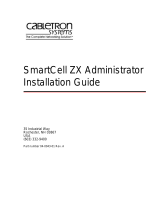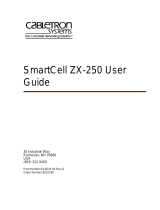Page is loading ...

Copyright © 2014 Ruckus Wireless, Inc.
Published September 2014, Part Number 800-70492-001 Rev D
Page 1 of 4
T300 Access Point
Mounting Guide
This Mounting Guide provides step-by-step instructions on how
to field-install the Ruckus Wireless T300 Omni 802.11ac outdoor
access point (AP). Unless specifically indicated, the rest of this
document refers to the T300 as an AP.
For detailed information on planning the installation, performing a
site survey, preparing the AP at the depot and shipping to the
field, refer to the T300, T301n and T301s 802.11ac Outdoor
Access Point Installation Guide. For information on configuring
and operating the AP, refer to the ZoneFlex Outdoor Access Point
User Guide. Both documents are available at
https://support.ruckuswireless.com
.
WARNING: Only trained and qualified personnel should be
allowed to install, replace, or service this equipment.
WARNING: Installation of this equipment must comply with local
and national electrical codes.
CAUTION: Make sure that you form a 80mm - 130mm (3”-5”)
drip loop in any cable that is attached to the AP or the building.
This will prevent water from running along the cable and entering
the AP or the building where the cable terminates.
CAUTION: Be sure that grounding is available and that it meets
local and national electrical codes. For additional lightning
protection, use lightning rods and lightning arrestors.
CAUTION: Make sure that proper lightning surge protection
precautions are taken according to local electrical code.
WARNING: Ruckus Wireless strongly recommends that you wear
eye protection before mounting the AP.
THIS GUIDE IN OTHER LANGUAGES
• 请从以下网站获得该指南的简体中文版
https://support.ruckuswireless.com.
• Vous trouverez la version française de ce guide à l'adresse
suivante https://support.ruckuswireless.com
.
• こ の ガ イ ド の日本語版は https://support.ruckuswireless.com
でご覧く ださい。
• 이 가이드의 한국어 버전은 웹 사이트
(https://support.ruckuswireless.com
) 에서 확인하시기 바랍니
다 .
• Veja a versão em português (Brasil) deste guia em
https://support.ruckuswireless.com.
• Puede ver la versión en español (América Latina) de esta guía
en https://support.ruckuswireless.com.
REQUIRED HARDWARE AND TOOLS
• Torque wrench or torque screwdriver with sockets and bits
• Wide flat-blade screwdriver
• Medium flat-blade or No. 2 Phillips screwdriver
• Customer-supplied outdoor-rated Cat5e UTP RJ-45 Ethernet
cable with 4.0mm to 6.5mm (0.17" to 0.26") round cable
sheath
If you need to lock the mounting bracket to the AP, then you will
also need:
• One customer-supplied stainless steel 6mm M3 panhead
locking security screw and security screwdriver.
If you are mounting the AP on a flat surface, then you will also
need:
• Customer-supplied wall anchors with up to M6 or 0.25”
stainless steel screws rated to withstand 128 N or 28.8 lbf
(required to withstand wind loads of 266km/h or 165mph)
NOTE: The screw head/washer combination shall not exceed
3mm (0.12") in height.
• Electric drill with drill bits and customer-supplied wall anchors,
flat washers, and hex nuts for
flat-surface mount
If you are mounting the AP on a pipe or pole, then you will also
need:
• A 25.4mm to 63.5mm (1.0" to 2.5") pipe or pole
• Two factory-supplied stainless steel clamps
BEFORE YOU BEGIN
Before deploying Ruckus Wireless products, please check for the
latest software and the release documentation.
• User Guides and Release Notes are available at
http://support.ruckuswireless.com/documents
• Software Upgrades are available at
http://support.ruckuswireless.com/software
• Open Source information is available at
http://opensource.ruckuswireless.com
• Software License and Limited Warranty available at
http://support.ruckuswireless.com/warranty
PACKAGE CONTENTS
Before deploying your AP in the field, verify that all items listed
below are included in the package. If any item is damaged or
missing, notify your authorized Ruckus Wireless sales
representative. Also, make sure that you have the required
hardware and tools.
• One T300 AP (A in Figure 1); includes one wall- or pole-
mounting bracket and one 12mm M6x1 earth ground screw
with split lock and flat washers
• One M25 data cable gland (B in Figure 1)
• One green/yellow earth ground wire with ring terminal (C in
Figure 1)
• Two SAE32-sized stainless steel clamps, 2.5-inch diameter (D
in Figure 1)
Figure 1: AP field-installation package contents
The field installation package can also include:
• Service Level Agreement/Limited Warranty Statement
• Regulatory Statement
• Registration card
• Declaration of Conformity, if required
•This Mounting Guide
CAUTION! The minimum software revision for the T300 AP is
ZoneFlex (ZF) 9.8.1, or SmartCell Gateway (SCG) 2.5.1 or later, or
virtual SmartCell Gateway (vSCG) 3.0 or later.
Do not connect the T300 AP to a Ruckus Wireless Controller
with ZF 9.8.x or earlier, or to SCG 2.5.x or earlier, or to vSCG
2.x or earlier.
A CB
D

Copyright © 2014 Ruckus Wireless, Inc.
Published September 2014, Part Number 800-70492-001 Rev D
Page 2 of 4
T300 OMNI ANTENNA COVERAGE
The T300 AP (ordering part number 901-T300-xx-01) is best
deployed where internal-antenna lateral beamforming can provide
the greatest reach and throughput to a wide coverage area, or to
provide the greatest distance between APs in a connecting mesh
device. See Figure 2 for a typical side view coverage pattern, see
Figure 3 for a typical top view coverage pattern, and see Figure 4
for a typical mesh coverage pattern.
Figure 2: Typical AP omni coverage, side view
Figure 3: Typical AP omni coverage, top view
Figure 4: Typical AP mesh elevation plane coverage, side view
STEP 1: CONNECTING AND SEALING THE RJ-45
C
ABLE
The AP uses one RJ-45 cable for Power over Ethernet (PoE).
Connect and seal the cable using the M25 data cable gland (B in
Figure 1).
1 Feed the end of the RJ-45 cable through the sealing nut (D in
Figure 5), rubber sealing insert (C in Figure 5), clamping ring
assembly (B in Figure 5) and cable gland base (A in Figure 5).
Figure 5: RJ-45 cable and cable gland assembly
2 Use a wide flat-blade screwdriver to remove the blanking cap
from the AP.
3 Connect the cable to the Ethernet port in the AP.
4 Tighten the cable gland base into the AP chassis to 7 N.m or
62 in-lbs.
5 Wrap the clamping ring assembly around the rubber sealing
insert. Make sure that the clamping ring assembly fully
encloses the rubber sealing insert.
6 Seat the clamping ring assembly and rubber sealing insert in
the cable gland base.
7 Tighten the sealing nut to 1.1 N.m or 10 in-lbs, or until the
rubber sealing insert is compressed.
8 Continue with Step 2a: Attaching the Mounting Bracket to a
Flat Surface or Step 2b: Attaching the Mounting Bracket to a
Metal Pole.
Limited Reach
Good Reach
Excellent
Reach
Excellent
Reach
Option 1
Option 2
Good
Reach
Excellent
Reach
Excellent
Reach
Limited
Reach
Azimuth Plane Coverage
Excellent
Reach
Excellent
Reach
Excellent
Reach
A
B
C
D

Copyright © 2014 Ruckus Wireless, Inc.
Published September 2014, Part Number 800-70492-001 Rev D
Page 3 of 4
STEP 2A: ATTACHING THE MOUNTING BRACKET TO A
F
LAT SURFACE
1 The AP mounting bracket attaches to the AP using a captive
screw. Use a medium flat-blade or No. 2 Phillips screwdriver
to loosen the captive screw (A in Figure 6) and pull up on the
end of the bracket to remove the bracket from the AP (B in
Figure 6).
Figure 6: Removing the mounting bracket
2 Using either of the two options shown in Figure 7, hold the
mounting bracket at the location on the mounting surface
where you want to mount the AP. Use the holes on the
mounting bracket as a template to mark the locations of the
mounting holes.
NOTE: The mounting bracket can be mounted to a vertical or
horizontal surface to support the AP in the required orientation.
Figure 7: Mounting bracket on a flat surface
3 Remove the mounting bracket from the mounting surface.
4 Drill holes required for the customer-supplied mounting
hardware.
5 Attach the mounting bracket to the flat surface using the
mounting hardware.
6 Using the mounting hardware instructions, tighten the
hardware to secure the mounting bracket.
7 Continue with Step 3: Mounting the AP
.
STEP 2B: ATTACHING THE MOUNTING BRACKET TO A
M
ETAL POLE
1 The AP mounting bracket attaches to the AP using a captive
screw. Loosen the screw (A in Figure 6) and pull up on the end
of the bracket to remove the bracket from the AP (B in Figure
6).
2 Insert the open end of one steel clamp (D in Figure 1) into two
of the slots on the mounting bracket.
NOTE: The mounting bracket can be mounted to a vertical or
horizontal pole to support the AP in the required orientation.
3 If necessary, daisy-chain the other steel clamps to
accommodate larger poles.
4 Using either of the two options shown in Figure 8, use the
clamp(s) to attach the mounting bracket to the pole. Tighten
the clamps to 3 N.m or 27 in-lbs, or per manufacturer’s
specifications if the factory-supplied clamps are not used.
Figure 8: Mounting bracket on a pole
5 Continue with Step 3: Mounting the AP
.
STEP 3: MOUNTING THE AP
1 Snap the mounting bracket back onto the AP (A in Figure 9),
and use a medium flat-blade or No. 2 Phillips screwdriver to
tighten the captive screw to 1.1 N.m or 10 in-lbs to secure the
bracket to the AP (B in Figure 9).
Figure 9: Attaching the mounting bracket to the AP
2 Optional Step
: If you also need to lock the mounting bracket
to the AP, then use a matching security screwdriver to screw
the customer-supplied locking stainless steel 6mm M3
panhead security screw through the mounting bracket and
into the AP chassis.
CAUTION: Make sure that the customer-supplied locking
stainless steel M3 panhead security screw is no longer than 6mm.
If the security screw is longer than 6mm, it can damage the AP
chassis.
Figure 10: Locking the mounting bracket to the AP
3 Continue with Step 4: Earth Grounding the AP
.
STEP 4: EARTH GROUNDING THE AP
CAUTION: Make sure that earth grounding is available and that it
meets local and national electrical codes. For additional lightning
protection, use lightning rods and lightning arrestors.
NOTE: The color coding of ground wires varies by region. Before
completing this step, check your local wiring standards for
guidance.
• Using the factory-supplied ground wire and ground screw,
connect a good earth ground to the AP chassis ground point
(A in Figure 11).
CAUTION: The T300 AP includes one 12mm stainless steel M6x1
earth ground screw with split lock and flat washers. Make sure
that any replacement screw is no longer than 12mm. If a screw is
longer than 12mm, it can damage the AP chassis.
Figure 11: Connect good earth ground to AP here
Congratulations! You have mounted your T300 access point.
A
B
Option 1 Option 2
Option 1 Option 2
A
B
Ground
Screw

Copyright © 2014 Ruckus Wireless, Inc.
Published September 2014, Part Number 800-70492-001 Rev D
Page 4 of 4
TROUBLESHOOTING
CAUTION: If required, you can reset the AP to its factory default
settings by pressing the reset button located inside the PoE IN
port. DO NOT DO THIS UNLESS SO INSTRUCTED. (Doing this
resets the AP IP address to 192.168.0.1.)
NOTE: After a reset, you can access the internal AP web interface
using
https://192.168.0.1. Your device must use any
other address from 192.168.0.2 through 192.168.0.254, with
subnet mask 255.255.255.0 and default gateway 192.168.0.1.
The username is super, and the password is sp-admin. Refer
to the T300, T301n and T301s 802.11ac Outdoor Access Point
Installation Guide and the ZoneFlex Outdoor Access Point User
Guide for information on configuring and operating the AP. Both
documents are available at https://support.ruckuswireless.com
.
NOTE: After an AP is removed from its mounting, it may drip
some water from the channel surrounding the radome. As long as
the AP has been operating normally, this incidental water
collection and dripping is normal, and is not service-affecting.
/






